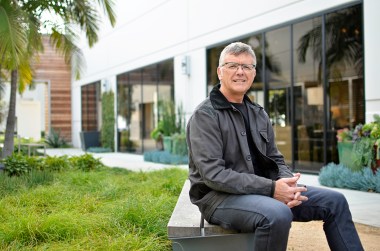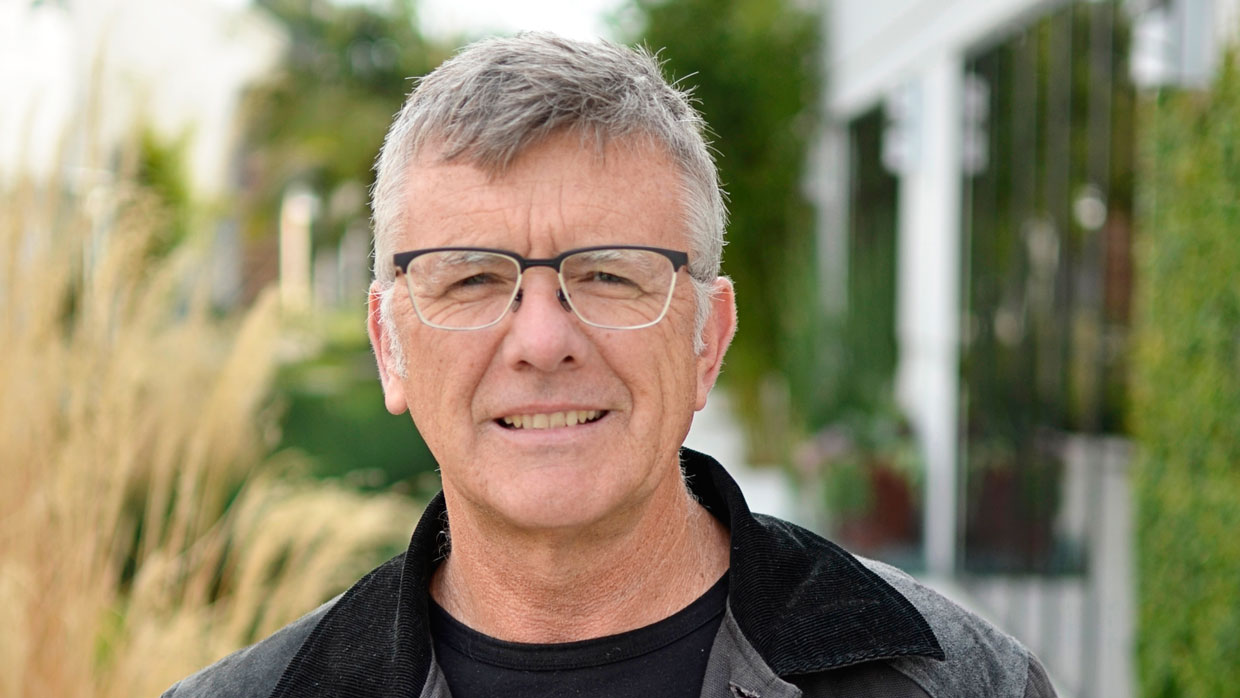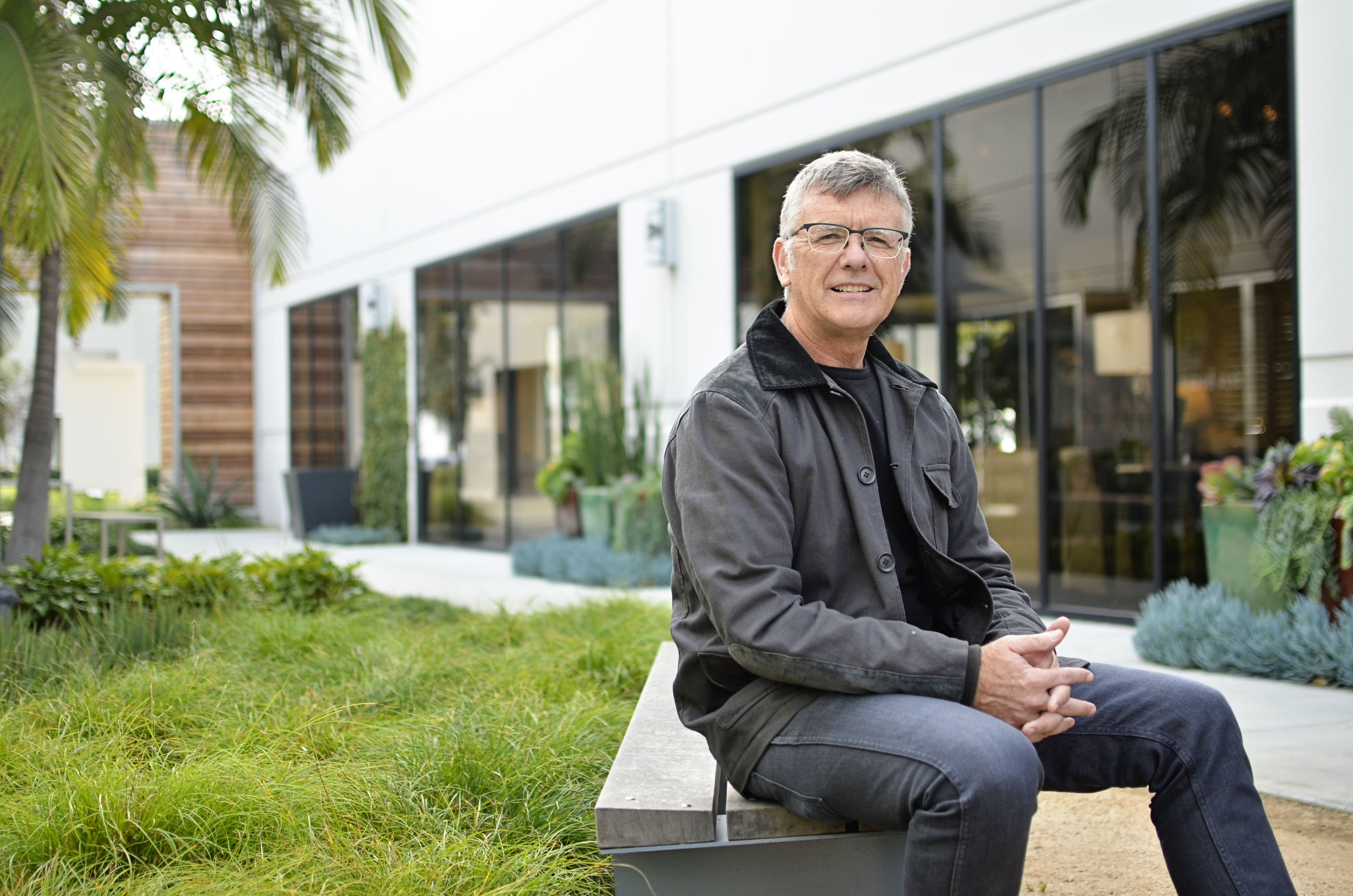Five days after the death of Chuck Smith, the hippie-loving founder of the Calvary Chapel movement, son-in-law Brian Brodersen became the next senior pastor at the movement's flagship congregation in Costa Mesa.
In his first major interview as senior pastor in Costa Mesa, Brodersen says his relationship with Smith goes back to the early days of the Calvary Chapel movement, when Brodersen was a new disciple and manager of a surf shop. That's when Smith invited him to minister as an intern, and within a few years Brodersen became pastor of Calvary Chapel in San Diego.
In the last half century, Calvary Chapel has grown from a single Bible study to a worldwide fellowship of more than 1,500 churches and ministries, yet not without its problems. In a 2007 CT interview, one pastor said of Calvary Chapel, "The Titanic has hit the iceberg. But the music is still playing." Calvary Chapel is, however, still afloat, and has survived not just growing pains, but also allegations of pastoral misconduct, lawsuits, and scandals.
In a historic transition in 2012, Calvary Chapel officially established an association with a 21-member leadership council, which now guides the worldwide organization Chuck Smith fostered. In December, CT's senior editor, global journalism, Timothy C. Morgan interviewed pastor Brodersen.
Did you ever imagine someday filling the shoes of the Calvary Chapel founder?
I grew up in Southern California surf culture with a Roman Catholic upbringing. I did not come to faith through Chuck or his ministry. I came to faith through an encounter with the Lord in my room one night. Knowing the reputation of Calvary Chapel, I plugged in.
I met my wife Cheryl, Chuck's daughter, and we married. I was managing a surf shop. Chuck gave me an invitation to come on and train as an intern pastor. I was happy working at a surf shop and sharing the gospel. But Chuck gave me the invitation. He saw my fervency. He said, "I want to train you. Why don't we just give it a try and see what happens." Chuck really wasn't mystical. He had a phrase that he would often use: "God works supernaturally in very natural ways."
Then, I pastored a church in San Diego North County. The Lord began to speak to me, shaping my ministry more after my personality and less after Chuck. In 1993, Chuck first approached me about being his successor. But in 1996, I felt God was calling me to go to the UK, but I consulted with Chuck. He was very upset. On the day I told him I had a plan to go to the UK and spend six weeks there, I said, "I'm sorry I ruined your day."
His response to me was, "You did not ruin my day. You ruined my life. You shouldn't leave your church for six weeks. That's too long. What kind of a shepherd are you?" This plan was something unheard of at Calvary Chapel. The model at Calvary is you plant a church. If the church grows and becomes successful, you stay and spend the rest of your life there.
The Lord spoke to me and said, "Are you listening to Chuck or are you listening to me?" I realized I needed to do what God is telling me to do.
The Calvary Chapel movement is known for the so-called Moses' model of leadership. Is this as prevalent as some say?
It's exaggerated by people on the outside and by the disgruntled. At Calvary, Chuck Smith was the senior pastor and operated as a person who believed God called and guided him. Coming out of the denominations as he did, he didn't want to have his hands tied. The Moses model that you find at Calvary is Chuck's way of explaining leadership. It's certainly not a required model. People do not understand that, even people within Calvary Chapel itself who say, "Well, we've got to do our church government like this, right?"
Well, no, you don't have to. This is just the way Chuck did it.
Where did this more rigid idea of Smith's come from?
In the later years, people got around Chuck who thought that they knew what he felt about everything. They would start speaking for him. What they were saying simply just was not true. It made it look to some degree like Chuck had really become rigid. He had really tightened things up, and he had really become a control freak.
These were interpretations of Chuck by people around him who had personal agendas. It was to their advantage to try to interpret Chuck that way, because it would help extend their power.
Knowing Chuck as well as I did, I would say, "Look. You're wrong. That's not how Chuck feels, because I've had a conversation with him about it. He doesn't feel the way you think he does."
I'm not saying it was intentional. People thought, Well, I know Chuck, and this is the way he thinks about this. Those who knew him better would say, "No, that's not how he thought about it."
How are Calvary Chapel leaders addressing the reality that more Americans are turning their backs on organized religion?
All through church history, the church tends to lose touch with the culture. God raised Calvary Chapel up because much of the church at the time was out of touch with the culture.
The people in my generation could relate to Calvary Chapel. It wasn't weird religious. You could wear your surf trunks, T-shirt, and flip-flops to church and carry your Bible. You could still go out and surf, and nobody was going to tell you that you were sinning.
God brings into existence ministries that are relevant to the culture. Forty-plus years have passed. We are in a danger that every other previous group has been in—becoming irrelevant. The church has lost touch with the larger culture. The Lord knows everything and knows exactly what needs to be done to reach every generation. We need to be in step with what God's doing, not what God did 30 years ago. If we're stuck in what God did back then, we're going to miss what he might want to do today.

Calvary Chapel has a reputation for being between fundamentalism and Pentecostalism. Has that ever really been true?
It would only be connected back to Chuck's roots in the Foursquare Church. Theologically, we are definitely non-cessationist. We believe in the ongoing ministry and gifts of the Holy Spirit.
Theologically, I would say fundamental in the best sense of the term. We believe in biblical inerrancy. We believe in all the cardinal doctrines of the faith, and we're going to go to our grave holding fast to those things.
We need to make sure we are not following culture that is prohibitive to the gospel. What happened in our movement? We became more and more traditional. That has worked against us. As a church, we have become more culturally conservative. We maintain our theological conservatism. We need to be more Christ-centered. Confusing the United States of America with the church is part of the problem.
Churches are criticized for supporting traditional sexuality. Are you publically encouraging a pastoral response or prophetic response?
We do not want to address that every time we are in the pulpit. The position we take is: If we come to it within the biblical text, we are going to address it and be faithful to what the Bible says.
We have people coming in here from a gay background. We want them to know that they are welcome to hear the gospel, receive Christ, and have a life transformation. We need more wisdom to navigate these things. This is just another type of sin. Everybody is struggling with sin. A person happens to be struggling with same-sex attraction, or whatever, let's see what God has to say about that. Let's help this person get victory.
What is Calvary Chapel's place in the larger evangelical movement, particularly in advocacy on issues such as immigration reform?
Calvary Chapel has been isolated when it comes to the bigger picture of evangelicalism. I do not think it's been healthy. I would like to see us more engaged. But some of the things you've mentioned like immigration reform—these are not things that I am going to address from the pulpit necessarily. We obviously need immigration laws. Personally, I feel like the church sometimes has too much to say and quite often is saying the wrong thing about it.
Individual Christians should be involved. I do not want to get up in the pulpit harping on some purely political issue. That is where churches are making a huge mistake. Sometimes there is a clear biblical perspective on it, and sometimes not. We have to use our judgment and the wisdom God gives us to see what the common sense solution is or what the best possible thing is. We might not have a Bible verse to apply to it.
Is ministry to American Muslims a priority?
We are very proactive in outreach to Muslims. We have a large university that has a huge Islamic population on the campus.
God is bringing the mission field to us. There is a better way to approach it than being combative. When I was a Roman Catholic, if people came to me and wanted to talk to me about the pope being the Antichrist, I did not want to hear a word they had to say. Muslims feel the same way. If you come on the attack, then you are closing a door instead of opening a door. I am not saying we do not tell it like it is. Let's tell the right stuff.
What do you see as the greatest threat to pastors today? Is it the classic temptations of money, sex, and power, or something else?
The most dangerous is power. We always have to be on our guard, maintaining humility. I am very dependent on God for everything I do. If I forget that and start thinking that I'm doing this because I'm an expert, then it's not going to be long before I become unraveled. Every time I approach the pulpit, I am in the same position: "God, unless you show up this is not going to go well. So please, come and help."
You can follow Timothy C. Morgan on Twitter @tmorgan815.










